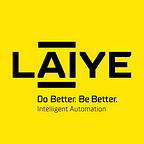COVID-19 has certainly highlighted a need for digitisation as businesses seek to adapt to the “new normal” by leveraging modern technologies and transform themselves into more efficient, leaner enterprises. Intelligent automation solutions are just one example of a modern advancement that has been heavily utilized to combat business challenges presented by the pandemic, and while many organisations were quick to realize the value of automation, the focus has now shifted to simplifying the adoption process and reducing employee dependence on IT personnel. Now more than ever, businesses have been prioritizing user friendly interfaces and low-code functionality.
As a low-code AI-powered RPA automation platform, Laiye RPA effectively bridges the gap between technical and non-technical workers while also alleviating some of the burden from IT departments during this time of pandemic-driven digital acceleration. Having been utilised in both private and public sectors, Laiye RPA’s ease of use and low-code functionality has proven to be invaluable in boosting productivity levels, increasing efficiency and improving collaboration between cross-functional teams to ensure the intended objectives are met in a timely manner.
What is Low-Code?
Low-code solutions are composed of user-friendly visual interfaces with drag-and-drop features, pre-set commands, libraries, and rely on simple logic as opposed to extensive coding languages. Since the low-code market has now expanded to include RPA and AI platforms, users of varying skill levels can easily build sophisticated automation processes without having any prior coding knowledge or technical skills.
High Rise of Low-Code
Gartner predicts 65% of all application development functions to be built with low-code by 2024, whereas, 66% of large corporations are expected to implement a minimum of four low-code tools and platforms. There’s no question that the demand for low-code has surged in the recent years and will continue to grow in a post-pandemic climate.
In this era of accelerated technological progress, many of us have been forced to confront our own less-than-ideal IT skills, a humbling experience to remind us the importance of the ease-of-use factor and user-friendly interfaces.
In the past, business executives felt the requirement of technical knowledge for operation of RPA platforms to be a significant barrier to fulfilling business objectives in a timely manner. But that is no longer the case. Low-code RPA solutions with advanced AI functionalities have entered the market to serve as a better alternative to lengthy IT deployment processes, presenting a myriad of benefits including:
Speed: Low-code programming does not require walls of code to be written for process execution. In Laiye RPA, the drag-and-drop functionality in combination with access to comprehensive libraries, pre-built templates, and pre-existing models enable the user to effortlessly program an automation according to their precise needs. The visual view serves to not only improve user convenience but also drastically slash development and deployment time.
Accessibility: Low-code RPA platforms which require little or no prior coding knowledge are accessible to all types of employees with varying skill levels. As a result, this encourages individuals to have a direct involvement in designing the technical process, which would ultimately promote higher innovation within the organisation and elevate both the employees and the organisation to a new level of versatility. In addition, experienced developers are enabled to work more intelligently by minimizing their efforts on mundane aspects of programming and accelerate their work processes.
Agility: Low-code RPA solutions lead to greater flexibility. They score high on customizability since they can be tailored precisely to specific business needs and enable businesses to readily respond to abrupt changes or new customer needs. Making modifications in traditional coding can be highly time-consuming, however, this is not the case with low-code platforms such as Laiye RPA which allows quick and convenient changes to made with minimal effort, thereby, providing the rapid responsiveness crucial to the COVID climate.
Addressing Developer Shortages: It’s no secret that the talent pool in software development and computer programming is heavily understaffed — the talent shortage in the IT sector has been widely documented; It’s predicted that there will be a global shortage of over 85 million tech workers by 2030. As larger companies attract the best and the brightest programmers with lucrative compensation packages, small and medium companies struggle to recruit well-qualified RPA developers. Low-code solutions are a perfect remedy to this common challenge as rather than hiring from an external talent pool, organisations can look inwards to widen the skill base of existing employees to save labour costs and increase productivity.
Low-code RPA solutions have opened doors to a wider range of users, enabling them to make meaningful contributions to the automation process in a time-effective manner. With a radically transformed working environment and accelerated digital transformation, there has been a need for technological familiarity in an increasingly digital world — a need finally fulfilled through low-code RPA solutions. The days of intensive hand-coding are long gone, and it is with low-code RPA solutions that businesses will achieve a greater degree of business innovation and organisational agility, ultimately thriving in a changed landscape as we emerge from the COVID crisis.
About Laiye
Laiye has rich experience in RPA + AI and helps businesses and people realize their full potential by optimizing the human-machine collaborative alliance with sophisticated, dynamic, productivity-enhancing digital, low-code “workforce solutions”. Laiye delivers the deepest, most advanced AI/RPA/NLP solutions to help businesses become more efficient, effective, agile, and successful. And it frees people to focus on meaningful, innovative, mission-critical initiatives.
Core technologies include robotic process automation (RPA), process mining, natural language processing (NLP), conversational intelligence, text recognition, and image recognition.
